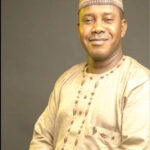Debrah Jalmet is an actress, film maker, script writer, among other entertainment engagements. She is also the Plateau State Chairperson of the Nollywood Artistes Association and founder of Plateau International Film Festival (PIFF) and Hometown Media Production, Communications and Entertainment. In this interview, she explains why she uses her films to tell the African story.
Weekend Magazine: What inspired you to go into film acting, and how did it all begin?
Debrah Jalmet: Film making has always been something I love becauseI love telling stories. When I was growing up, I could just cook up stories and tell my sisters, including my dad, and they will be fascinated and ask me to tell them more. That was how I began telling captivating stories until I met a very good friend and mentor who is a Professor in Canada, and who tremendously inspired me.
- PODCAST: NRC postpones Lagos – Kano Train Service
- COVID-19: Minister urges strict adherence to protocols
I then decided to go to film school, and I met Brian Etuk of the Nigerian Film Corporation who motivated me when I indicated interest to go to the film school and he made the dream come to pass. Nduka Otiono on his part encouraged me to go into script writing. Whenever I write, I will give it to him to review, and he always made sure I script down something regularly. That was how I became a film maker.
WM: Apart from being an actress yourself, you are also a film maker, commercial/content developer, producer, director, script writer and media consultant. How do you handle all of these at the same time?
Jalmet: I handle all my activities and engagements pretty well, and because they are things I love doing, I am not under pressure performing the functions. Sometimes, it can be tiring, yet I am not pressured or shy away from engaging in them. Basically, I create time for anything I do, even though I sometimes prioritize.
WM: You are the Plateau State Chairperson of the Nollywood Artistes Association. What are basically your roles of engagement?
Jalmet: My basic role as the Plateau State Chairperson of the Nollywood Artistes Association is to bring together creatives in the state and co-opt them into the art industry. You know that in Plateau State we have a lot of talents, but the problem is that we don’t have the platforms to showcase our talents. So as chairperson of the association, I am saddled with the responsibility of identifying talents, encourage and promote them, and also create a platform for them to grow.
It is a bit challenging because organizations don’t really come into Plateau State to invest in the entertainment industry and successive governments have not really been supportive. So, I need all the support I can get to achieve this feat.

WM: You are also the founder of Plateau International Film Festival (PIFF) and Hometown Media Production, Communications and Entertainment. Tell us more about them.
Jalmet: The Plateau International Film Festival (PIFF) is an event organized to identify talents and celebrate creativity. That is one of the platforms I was referring to earlier. So, at the festival we also showcase Plateau and we tell our story from the Plateau point of view. Despite the security challenges on the Plateau, we try to look at the good happenings and show them to the world; that Plateau has abundant good things and stories other than crises.
The festival is also a platform for upcoming film makers to meet and network, and we also groom them and showcase them to the world. This year’s edition is in October, the last week of October precisely. And we are doing our best to come up with new initiatives.
WM: Plateau State is blessed with so many talents in acting and entertainment generally and have produced many international figures today. This is in addition to the Nigerian Film Institute in the state. Yet the film/entertainment industry is not flourishing as expected. What is actually the problem?
Jalmet: The problem as I earlier hinted is lack of support. We don’t have individuals, organizations or government that is interested in promoting the industry. People like Kenneth Gyang and Steve Gukas, alongside other independent film makers, have been assisting with showcasing talents but we still need more support, and one person alone cannot do it.
People should know that the film industry if well developed can boost the economy and create jobs. Nonetheless, it is a know fact that Plateau has produced many talents doing well and internationally recognized.
WM: You are reputed for your passion in using films to tell the African story, unlike others who ‘westernize’ their films. What inspired that concept?
Jalmet: My inspiration for using films to tell the African story is nothing other than my love for Africa, Nigeria and my environment. You know there is no place like home, and no matter what one does, that person will surely come back home. So, I believe that African stories need to be heralded and heard. Though we were colonized by the British, yet we are Africans with a rich culture and stories to tell. In a nutshell, I am proud to be an African and I will continue telling my stories from that point of view. In as much as we appreciate the international community, we need to appreciate ourselves and what we do – our tradition, struggles, our focus, lifestyles, among others.
WM: What then is your advice to film makers who don’t use their films to tell the African story?
Jalmet: The truth is we are different people and we are all made differently. So, every film maker must not use their films to tell the African story. But the basic thing is that no matter the story a film maker tells, he/she should put in the needed creativity.
WM: Have you done any film to precisely tell the story of your home state of Plateau or to project Plateau to the world?
Jalmet: Yes, and even now we are working on a project that captures the life of Plateau. Though I would need to do more of such stories.
WM: You have acted alongside many bigwigs in the film industry. How do you feel acting alongside such personalities, and to what extent do they inspire you?
Jalmet: The couple of bigwigs I worked with have inspired me and I am super proud of them. One of them is Ali Nuhu; he is an amazing actor. He supports you to get your lines easily and all that. And he makes one to work on him or herself.
WM: You are widely known for your fluency in speaking the Hausa Language, such that many people believe that your deep intonation/assent of the language is more than that of some Hausas themselves. How did you understand and speak the language in such a fascinating manner?
Jalmet: I grew up among the Hausas, that was when Plateau was not as divided as it is right now. Then people, irrespective of ethno-religious differences, lived happily and peacefully together, and during the Sallah and Christmas celebrations we feasted together. So, it was easier for me to understand Hausa very well, and I am good in understanding languages, though I am from Mikang Local Government Area of Plateau State and I have my own local dialect, while my mum is Idoma from Benue State. That is why I look forward to the peaceful coexistence we know on the Plateau to return.
WM: Who is/are your role model(s) in the film and entertainment industry and why?
Jalmet: My role model is any exceptional, determined and creative mind. Someone who is passionate about creative story telling, has good shooting technique and someone who inspires other creative minds rather than seeing them as competitors. Those who believe that the sky is enough for everyone to fly in are people I appreciate so much.
WM: How do you connect and engage with your fans?
Jalmet: I connect with my fans through any means possible – live interactions, events, festivals, and online.
WM: What should the public be expecting from you soonest?
Jalmet: I am working on something good and they should be expecting it to be out soon. I don’t want to let the cat out of the bag yet. They should be aware though that from the association and other lined up activities, a lot of good stuffs are in the pipeline.
WM: What is your advice to upcoming actors/actress as well as those with acting potentials or intentions?
Jalmet: My advice for them is that they should work hard, understudy those ahead of them and be prayerful.

 Join Daily Trust WhatsApp Community For Quick Access To News and Happenings Around You.
Join Daily Trust WhatsApp Community For Quick Access To News and Happenings Around You.


